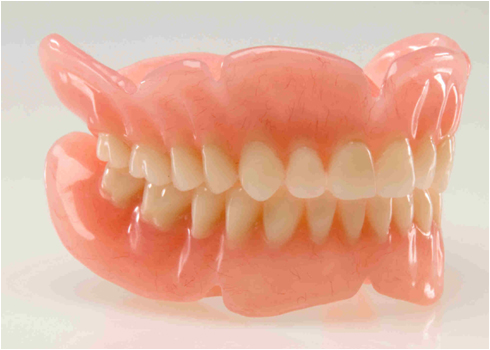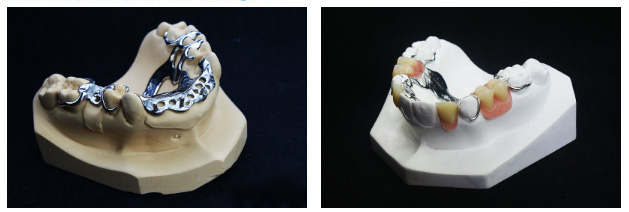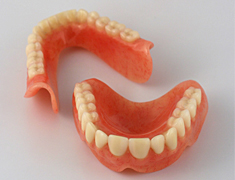Denture
Dentures are prosthetic devices constructed to replace missing teeth, and which are supported by surrounding soft and hard tissues of the oral cavity. Conventional dentures are removable, however there are many different denture designs, some which rely on bonding or clipping onto teeth or dental implants.

There are two main categories of dentures, depending on whether they are used to replace missing teeth on the mandibular arch or the maxillary arch. There are many informal names for dentures such as dental plate, false teeth and falsies.
What is a denture?

A denture is a removable replacement for missing teeth and adjoining tissues. Complete dentures replace all of the teeth, while a partial denture fi lls in the spaces created by missing teeth and prevents other teeth from shifting position.
Complete dentures are either “conventional” or “immediate.” A conventional denture is placed in the mouth after all of the teeth have been removed and the extraction sites have healed. An immediate denture is placed as soon as the teeth are removed.

There are basically two types of dentures:
Removable partial dentures
Removable partial dentures are for patients who are missing some of their teeth on a particular arch. Fixed partial dentures, better known as "crown and bridge", are made from crowns that are fitted on the remaining teeth to act as abutments and pontics made from materials to resemble the missing teeth. Fixed bridges are more expensive than removable appliances but are more stable.

Complete dentures
Conversely, complete dentures or full dentures are worn by patients who are missing all their teeth in an arch (i.e the maxillary(upper) or mandibular(lower) arch).
Fabrication usually takes a few visits whereby during the first visit, the dentist makes a molded impression of the teeth to be sent to a dental laboratory. You may be asked to return to the clinic for "trying-in". Once completed, the dentures will be issued to you.
Dentures tend to accelerate bone loss which makes dentures wearing more uncomfortable in later years. It is recommended that dentures should be replaced every 3-5 years.
Advice For Dentures Wearers

Your new dentures have been made to fit your mouth accurately and have been designed for your comfort, appearance and efficiency. The success of your new dentures depends on your cooperation.
- Wear your dentures regularly except when you are sleeping. When you are not wearing your dentures, immerse it in a bowl of cool water or cleansing agents. NEVER leave it dry or place in hot water.
- The gums, tongue and palate should be brushed with a soft bristle brush every evening when the dentures are removed, and each day before you insert the dentures to stimulate the gums and remove plaque accumulation.
- Your dentures may seem bulky and cause gagging sensation. Your tongue may feel crowded. However these sensations will disappear as you become accustomed to them. When excess pressure is exerted by the dentures on oral soft tissues, that area may become sore. The cheeks, lips, and tongue are very sensitive areas that require time to adjust to new dentures. It is not uncommon to bite one's cheek or tongue. Persistent soreness or irritation should be reported to your dentist and he can adjust the offending area for you. Be sure to wear the dentures for a couple of hours before the appointment.
- NEVER force your dentures into position or biting down on it when trying to put on your dentures. This may bend or break the clasps. Follow the instructions of your dentist.
- It will also take some practice learning to chew with your dentures. Begin by slowly chewing on very small pieces of soft food, using both sides of the mouth simultaneously. When eating, avoid hard or sticky foods and liquid which are too hot.
- The pronunciation of certain words may seem strange at first. Sometimes the muscles of your tongue, cheeks and lips will dislodge your dentures. You may have to practice keeping your dentures in place with these same muscles.
- Rinse your dentures and mouth after every meal. Thoroughly wash all surfaces of your dentures daily with water and commercial cleansing agents available. NEVER use a stiff brush and abrasive detergent as this can damage the plastic bases and teeth. Some people keep their dentures in an ultrasonic cleaner, but keep in mind that an ultrasonic cleaner does not replace brushing.
- Do not neglect your remaining natural teeth. They can be kept if you clean them thoroughly every day. Your dentist can show you the most effective method.
- NEVER adjust or repair your dentures yourself. You could further damage the dentures and your oral tissues. If your dentures does not fit or have been damaged, you should consult your dentist at once. Do not throw away any parts if your dentures are fractured.
- It is important to be reviewed by your dentist as instructed. Your dentist can refit the dentures and correct for tissues changes. Proper fit and support of the dentures is necessary not only for your comfort but to help prevent injury to the remaining natural teeth and supporting structures.
- With a well fitting dentures and practice, dentures adhesives may not be necessary. Dentures wearers should expect the lower dentures to fit somewhat loosely as they rest on a smaller surface of bone. They need to learn how to use the muscles of the cheeks and tongue to keep the dentures in place.